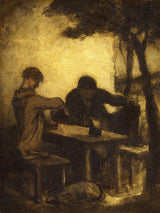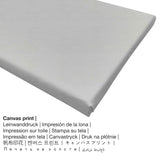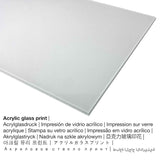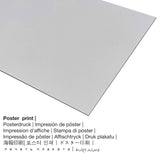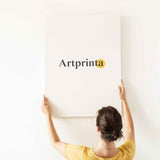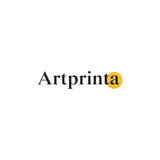Honoré Daumier, 1861 - Ndị na-aṅụ mmanya - mbipụta nka mara mma
Ụtụ gụnyere. Mbupu gbakọrọ na ndenye ọpụpụ.
Ozi mgbakwunye site na ihe ngosi nka (© - Ụlọ ihe ngosi nka nke obodo ukwu - www.metmuseum.org)
This painting, which was first exhibited in Paris in 1861, bears a resemblance to an illustration by Daumier's contemporary Paul Gavarni that was published twenty years earlier. The escape that alcohol offered to the poor is typical of the social themes Daumier explored throughout his career. The first owner of this work was the landscape painter Charles Daubigny.
Data ndabere gbasara nka nka izizi
| Aha nke ihe nka: | "Ndị na-aṅụ mmanya" |
| Nhazi nke ọrụ nka: | sere |
| Okwu mkpokọta: | nkà nke oge a |
| Time: | 19th narị afọ |
| Afọ okike: | 1861 |
| Afọ nka: | karịa afọ 150 |
| Usoro izizi: | mmanụ n'elu osisi |
| Akụkụ izizi (ọrụ nka): | 14 3/8 x 11 inch (36,5 x 27,9 cm) |
| Ụlọ ihe ngosi nka / ebe: | Museumlọ ihe ngosi nka nke Obodo |
| Ebe ngosi nka: | New York City, New York, Njikota Obodo Amerika |
| Webụsaịtị ihe ngosi nka: | Museumlọ ihe ngosi nka nke Obodo |
| Akwụkwọ ikike nka: | ngalaba ọha |
| Site n'aka: | The Metropolitan Museum of Art, New York, Arịrịọ nke Margaret Seligman Lewisohn, na ebe nchekwa nke di ya, Sam A. Lewisohn, 1954 |
| kreditline ọrụ nka: | Arịrịọ nke Margaret Seligman Lewisohn, na ncheta di ya, Sam A. Lewisohn, 1954 |
Nchịkọta nkenke nke onye na-ese ihe
| Aha onye nka: | Sọpụrụ Daumier |
| okike nke onye nka: | nwoke |
| Obodo onye nka: | French |
| Ọrụ nke onye na-ese ihe: | onye na-ese ihe |
| Obodo obibi: | France |
| Nhazi nke onye nka: | omenkà nke oge a |
| Ụdị nka: | Ihe ngosi |
| Oge ndu: | 71 afọ |
| Afọ amụrụ: | 1808 |
| Ebe amụrụ onye: | Marseilles |
| Afọ nwụrụ: | 1879 |
| Nwuru na (ebe): | Valmondois dị nso na Paris |
Ngwaahịa a
| Nkewa edemede: | nka nka |
| Usoro mmeputakwa: | dijitalụ mmeputakwa |
| Production usoro: | Mbipụta UV / dijitalụ |
| Mmalite ngwaahịa: | Germany |
| Stockdị ngwaahịa: | na mmepụta ihe |
| Ihe eji eme atụmatụ: | mgbidi mgbidi, ihe ndozi ụlọ |
| Ndozi onyonyo: | usoro eserese |
| Oke akụkụ: | ogologo ruo obosara 3: 4 |
| Nsonaazụ: | ogologo bụ 25% mkpụmkpụ karịa obosara |
| Nhọrọ ihe dị: | mbipụta akwụkwọ mmado (akwụkwọ kwaaji), mbipụta kanvas, mbipụta enyo acrylic (nwere ezigbo mkpuchi iko), mbipụta ọla (aluminium dibbond) |
| Ọdịiche dị n'okirikiri akwa akwa akwa (akwa akwa): | 30x40cm - 12x16", 60x80cm - 24x31", 90x120cm - 35x47" |
| Mbipụta iko acrylic (nwere ezigbo mkpuchi iko) dị iche iche: | 30x40cm - 12x16", 60x80cm - 24x31", 90x120cm - 35x47" |
| Mbipụta akwụkwọ mmado (akwụkwọ kwaaji): | 30x40cm - 12x16", 60x80cm - 24x31", 90x120cm - 35x47" |
| Mbipụta aluminom (aluminium dibond ihe) nha dị iche iche: | 30x40cm - 12x16", 60x80cm - 24x31", 90x120cm - 35x47" |
| Nhazi nke nka nka: | adịghị |
Nhọrọ akụrụngwa ngwaahịa
In the dropdown menu next to the product you can select a material and a sizeaccording to your preferences. The following sizes and materials are the options we offer you for individualization:
- Ugogbe acrylic ebipụtara: An acrylic glass print, often named a UV print on plexiglass, will change the artwork into beautiful décor. Besides, it offers a viable alternative option to aluminium and canvas fine art prints. The acrylic glass protects your selected art print against sunlight and heat for up to 60 years.
- Mbipụta aluminom (aluminium dibbond): This is a metal print made on aluminium dibond with an outstanding depth. A non-reflective surface creates a contemporary look. The colors are vivid and luminous, fine details of the print are crisp and clear, and you can feel the matte appearance of the surface. This UV print on Aluminum Dibond is the most popular entry-level product and is an extremely contemporary way to display art, since it draws attention on the image.
- Ebipụta akwụkwọ mmado na ihe akwa akwa: A poster print is a printed flat canvas with a slightly roughened structure on the surface. The poster print is particularly suited for framing your fine art print in a special frame. Please note, that depending on the size of the poster print we add a white margin of something between 2-6cm round about the print, which facilitates the framing with your custom frame.
- Kwaaji: A printed canvas, not to be confused with a canvas painting, is a digital image applied directly on cotton canvas. It has the special impression of three dimensionality. Canvas prints are relatively low in weight, meaning that it is quite simple to hang up your Canvas print without the help of additional wall-mounts. A canvas print is suited for any type of wall.
Ihe osise a akpọrọ "The Drinkers"dị ka akwụkwọ nka gị
In 1861 nwoke na-ese ihe Sọpụrụ Daumier made the realist painting. The version of the masterpiece measures the size: 14 3/8 x 11 inch (36,5 x 27,9 cm). Oil on wood was applied by the European artist as the medium of the work of art. Nowadays, the artpiece can be viewed in in the digital collection of Museumlọ ihe ngosi nka nke Obodo, which is one of the world's largest and finest art museums, which includes more than two million works of art spanning five thousand years of world culture, from prehistory to the present and from every part of the globe.. With courtesy of: The Metropolitan Museum of Art, New York, Bequest of Margaret Seligman Lewisohn, in memory of her husband, Sam A. Lewisohn, 1954 (nwere ikike: ngalaba ọha). : Arịrịọ nke Margaret Seligman Lewisohn, na ncheta di ya, Sam A. Lewisohn, 1954. Na mgbakwunye na nke ahụ, nhazi ahụ dị na Eserese format and has a ratio of 3 : 4, meaning that the length is 25% shorter than the width. Honoré Daumier was a painter, whose artistic style was primarily Realism. The European artist lived for a total of 71 afọ a mụrụ ya n'afọ 1808 in Marseilles and died in the year 1879.
Nkwupụta iwu: We try the best we can in order to describe the art products with as many details as possible and to demonstrate them visually. However, the pigments of the print products, as well as the printing may diverge to a certain extent from the representation on your device's screen. Depending on the screen settings and the quality of the surface, not all colors will be printed one hundret percent realistically. Given that the are printed and processed by hand, there might also be slight discrepancies in the motif's size and exact position.
© Nchekwa ikike nwebisiinka - Artprinta.com (Artprinta)

